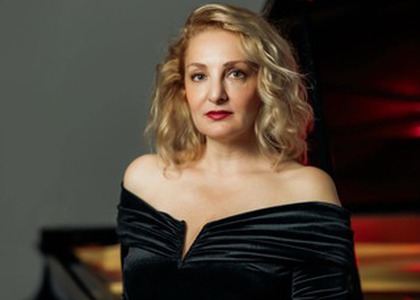> Interviews

Interview with pianist Mădălina Pașol
On Friday, December 6th, pianist Mădălina Pașol will launch her latest album, Algo-Rithm, released this fall by Casa Radio Publishing House. The event will take place at the Gaudeamus Book Fair, in Pavilion B2 Romexpo, at the Radio România stand. Mădălina Pașol spoke to our colleague Ioana Țintea about this album.
Mrs. Mădălina Pașol, the album Algo-Rithm, which you officially launched at the Gaudeamus Fair on December 6th, was premiered on Radio România Muzical. How did you perceive this first public encounter with this material?
It was a great joy for me to be able to hear the music and recordings on the radio station. The echoes were very nice and most of the people who listened to the tracks were delighted because it's perfect music for the upcoming holidays.
The album Algo-Rithm includes special recordings made on the stage of the Radio Hall in 2022, miniature pieces from different stylistic areas, ranging from baroque to modern creation, with incursions into Romanian music of the 20th century. How did you come up with the concept of this album and why did you choose to focus on piano miniatures?
As the title Algo-Rithm says, I somehow tried to have a conclusion of my whole career, starting from very small and delicate pieces that I also played as a child, such as Marșul piticilor (March of the Dwarfs) or Preludiu (Prelude) by Tudor Dumitrescu. Then I chose some pieces that have been discovered in recent years, such as Allegro by Wolfgang Amadeus Mozart or Albumblatt by Johannes Brahms, some exceptional works that have been kept until recently in the libraries or collections of great music lovers, and then I brought in a little bit of the youth repertoire, for children, because, as you know, I'm in the business of promoting young talent, and I very much wanted them to have another opportunity to discover other new pieces and perhaps to discover this love of minstrelsy and to love the shorter pieces dedicated to their age group.
So, your artistic journey is the red thread that links the pieces included on the album.
Yes, I would like to say so, although my technique or what I have become over the years of my piano career, I have a technique on larger, more large-scale pieces, as was my last CD of Robert Schumann - Kreisleriana and Liszt Sonata. My technique is a tumultuous one and I love passionate and forward-moving repertoire that is composed for the piano. Here I have devoted myself more to miniatures out of a desire to discover for myself repertoire perhaps even less played by great pianists.
Tell us about the title. At first glance, the title makes us think of the exact sciences.
Yes, math, in this selection, we go step by step through the history of music. Of course, we don't have a direct connection with mathematics, but the rhythmicity with which we have stepped throughout this album somehow leads us to think of a rhythm, an algorithm, a combination of mathematical sciences with interpretations, with everything that we experienced in the studio when we analyzed with the musical directors and with those with whom we developed this project in every detail so that it wouldn't become just another product, but we went into the greatest details and from there I think, this interweaving of everything that we prepared for this album, that's where the title, Algo-Rithm, comes a little bit. We analyzed and went into the smallest details, maybe even mathematically, if you're going to listen, the rhythm that we try to keep and the pulsation of each track tries to take us into a certain musical zone, which we find harder to penetrate in these moments when our life is tumultuous and expansive.
Translated by Bianca Daniela Penaru,
University of Bucharest, Faculty of Foreign Languages and Literatures, MTTLC, year II
Corrected by Silvia Petrescu














